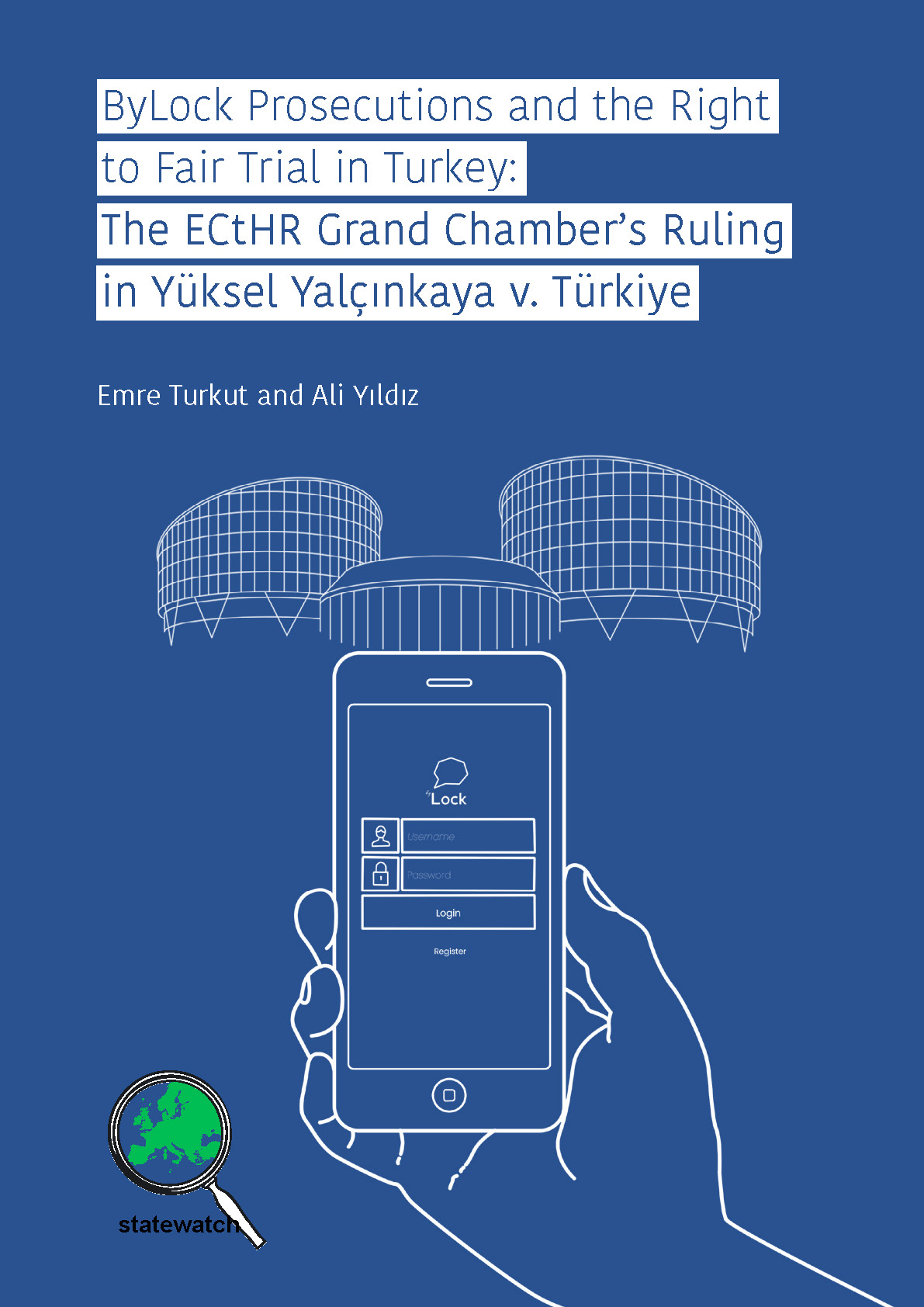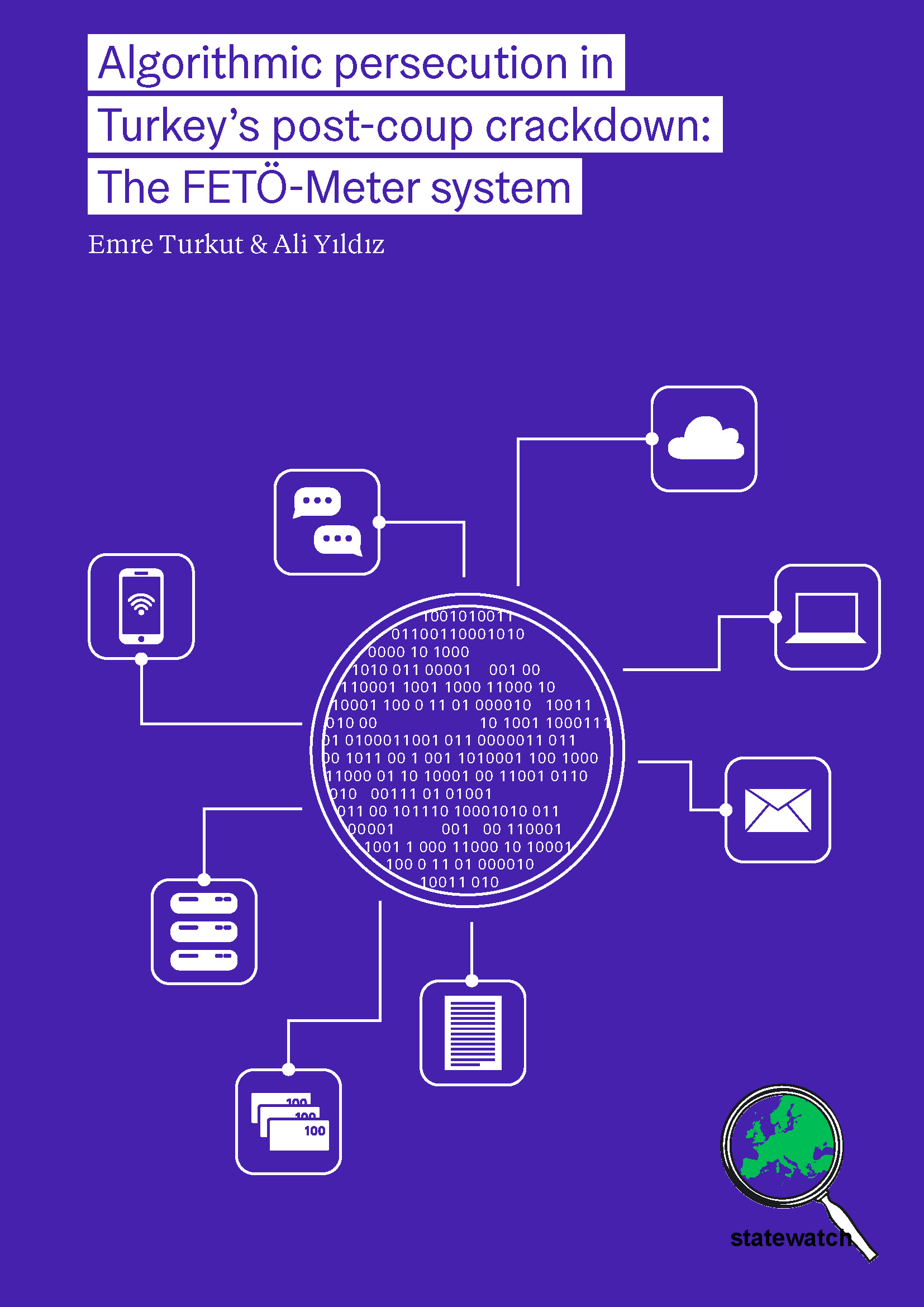ByLock Prosecutions and the Right to Fair Trial in Turkey: The ECtHR Grand Chamber’s Ruling in Yüksel Yalçınkaya v. Türkiye
Topic
Country/Region
13 March 2024
This report analyses the European Court of Human Rights' judgement in the case Yalçınkaya v Türkiye, which found that a conviction based on the use of the encrypted messaging app ByLock violated a number of rights: no punishment without law; the right to a fair trial; and freedom of assembly and association. The judgement represents a milestone in the legal and political discourse surrounding ByLock convictions, and should be used as the basis for retrials for the tens of thousands of people who have been punished for their alleged use of the app.
Support our work: become a Friend of Statewatch from as little as £1/€1 per month.
 Read the full report here (pdf) and the press release here.
Read the full report here (pdf) and the press release here.
From the introduction to the report
Since the 2016 attempted coup in Turkey, over 90,000 individuals including public servants, police officers, academics, judges, prosecutors, business people and even university students and housewives have been purged or arrested for their alleged use of ByLock, an encrypted messaging app similar to Signal and Telegram. In the immediate aftermath of the 2016 attempted coup, the Turkish authorities claimed that this app had been created exclusively for the ‘Gülen Movement (GM)’ – a religious organization designated as the FETÖ/PDY (Fetullahist Terrorist Organisation/ Parallel State Structure) due to their alleged involvement in organising the abortive coup. Since the post-coup emergency rule, the Turkish domestic courts, including the Turkish Court of Cassation and the Turkish Constitutional Court, have consistently regarded involvement in the ByLock network as sufficient grounds for convicting someone of membership in an armed terrorist organisation under Article 314(2) of the Turkish Penal Code, even in the absence of other evidence. In turn, those caught in the ‘ByLock’ dragnet have been frantically attempting to vindicate themselves, arguing that they either never downloaded the app or, if they did, never used it for criminal or terrorist activities.
The case of Yalçınkaya v Turkiye, decided by the Grand Chamber of the European Court of Human Rights (ECtHR) on 26 September 2023, represents a significant milestone in the evolving discourse surrounding the use of ByLock. In the Yalçınkaya decision, the Grand Chamber found that the applicant’s conviction based on the use of ByLock violated several important articles under the European Convention on Human Rights (ECHR), including Article 7 (no punishment without law), Article 6(1) (right to a fair trial) and Article 11 (freedom of assembly and association). More importantly, the Grand Chamber underscored that the problems leading to these human rights violations based on the vicious ByLock prosecutions were of a “systemic nature” and ordered the Turkish government to take appropriate general measures to address the issues, particularly regarding the Turkish judiciary’s handling of ByLock evidence.
This report provides a comprehensive analysis of the ECtHR Grand Chamber judgment in the Yalçınkaya case, and the prosecutions related to the use of the ByLock app in Turkey. The clarity and non-disputed nature of the Grand Chamber’s findings in Yalçınkaya under Article 7 of the ECHR are undeniably of paramount importance. However, we contend that the court left certain crucial questions unaddressed concerning the intersection of digital evidence and the right to a fair trial under Article 6 of the ECHR. Consequently, after conducting a thorough analysis of the Yalçınkaya judgment, we provide a nuanced examination of the Grand Chamber’s findings under Article 6 ECHR.
The report
Press release
Our work is only possible with your support.
Become a Friend of Statewatch from as little as £1/€1 per month.
Further reading

Algorithmic persecution in Turkey’s post-coup crackdown: The FETÖ-Meter system
Based on interviews with exiled members of the Turkish military, this report looks at how the Turkish authorities utilised something called the 'FETÖ-Meter' - an Excel-based algorithm based on hundreds of data points about individuals' activities, education, work history, family and personal contacts - to target officials for persecution in the wake of the attempted July 2016 coup.
Spotted an error? If you've spotted a problem with this page, just click once to let us know.

